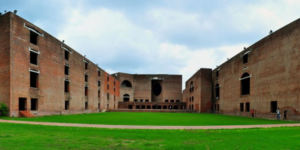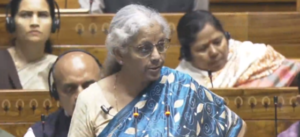Delhi University is again in the news. This academic institution appears to be driven by unacademic or extra-academic motivations. Earlier, it punished students for screening a BBC documentary and warned the Congress leader Rahul Gandhi to ‘cease and desist’ after he visited a hostel. Now, we learn that it is trying to withdraw papers on B.R. Ambedkar, Muhammad Iqbal and attempting to remove discussion on caste and feminism.
Media reports do not reflect the intensity of the tug-of-war between the university authorities and the teachers of the departments concerned. Teachers are under a lot of stress as they struggle to protect the integrity of their disciplines. Heads of departments are especially under tremendous pressure, as they are forced to choose between loyalty to their disciplines, or the administration and the ideology of the Rashtriya Swayamsevak Sangh (RSS). There are some who try to balance the two. They are tormented even more. There are still others who worry about showing their faces to their peers if their disciplines are betrayed.
It is essential for us to understand the context of this battle over courses and syllabus.
I can say without hesitation that DU authorities, like the administrations of many other universities, are now deploying the resources of the institution to turn the campus into a playground for the ideology of the RSS, i.e. Hindutva. Or to make it the “official ideology” of the university.
Consider the recent example of an alamanc published by the university published. It claims to be an ancient Indian method of calculating time, which is the “most scientific and needs to be preserved and promoted”. They should have the courage to call it the Hindu method of Kalganna. On every page, there are Hindu dates, festivals and pictures of Hindu deities. It is a poor replica of a Geeta Press’s Panchang. Where there is a picture of Guru Nanak Dev or Buddha, it is “balanced” with a picture of a Hindu deity in the other corner.
And yet, we need to ask the university authorities whether DU is a Hindu institution. Is this the only way, even if Indian, to calculate time? If the university is making the same argument that this is the scientific Indian system of time calculation, then there are other religious communities in India that have their own methods to calculate time. They are no less scientific or no less precise. Will the university also prepare these calendars?
Influence of RSS pracharaks
Until some time ago, when RSS pracharaks were called to programmes and events, they were called “intellectuals and thinkers”. Their real identity was not disclosed beforehand. Now, this hesitation is gone. RSS pracharaks and organisers are called officially and declare their affiliation openly. In a way, it is better than the earlier dishonesty. Teachers in many colleges say that the administration indicates that attendance is compulsory for these programmes. Especially temporary teachers. These pracharaks are also called to address teachers in professional workshops to introduce the teachers to the latest research in their respective fields. Obviously, it is a sheer waste of time for the teachers. All it does is fatten the ego of the pracharaks.
Last year in November, the administration staged a very expensive play, Chanakya, in the university stadium. One of my students was very disturbed after watching it. During the play, she was filled with fear when slogans of ‘Jai Shri Ram’ were raised and the play itself had a definite Hindutva leaning. My student is a Hindu herself but while watching the play, she wondered how a Muslim or Christian would feel in such an aggressive setting.
The authorities cannot escape with the excuse that students and teachers who feel uncomfortable are free not to attend. All spaces and programmes in the university have to be so organised that all members of the university community feel safe, equal and welcome.
Through these programmes, the atmosphere of the university is filled with Hindutva. In this environment, not only Muslims and Christians or followers of other religions, even Hindus like my student also feel alienated. The university cannot be made a platform for the propagation of Hindutva.
Until recently, universities had to spread the spirit of nationalism. In those days, it was necessary to hoist the national flag on a 302 feet high pole and build a wall of valour on the campus. Now the garb of nationalism has been thrown away and Hindutva is propagated brazenly. To this end, some universities are building temples, some others use bells, gongs, conch shells and sacred Hindu chants to “sanctify” their spaces or programmes. Recently, a video surfaced in which a NAAC team is being given a red carpet welcome on the campus of the Central University of South Bihar while you can hear the sound of conch shells, gongs and chanting of mantras! It leaves you speechless but university authorities do it with aplomb.
The RSS, however, also knows that the university actually lives in its courses and classes. And is made to come alive by its teachers. Unless all this changes, it is difficult to change its character through mere speeches or plays. It is not that easy to do either. There are still teachers trained in ‘anti-Hindutva knowledge traditions’. But now, the authorities owe their allegiance to the RSS-led government. Even when the RSS was not in power, it has been doing this through intimidation, violence and courts. For example, 11 years ago, A.K. Ramanujan’s essay ‘Three Hundred Ramayanas’ was removed from the reading list because of violence unleashed by some members of the Akhil Bharatiya Vidyarthi Parishad. There was also a campaign to remove the books of intellectuals like Nandini Sundar and Archana Kumar, calling them Maoist supporters, and therefore dangerous to read.
New pressures
Now we hear that the Department of Philosophy is under pressure to remove the paper on Ambedkar offered at the undergraduate level. It is not even a compulsory paper, just an elective. Yet, it was asked to be removed, on the pretext that a course cannot be based only on one thinker. To understand the meaning of this attempt to reduce the importance of Ambedkar, it is necessary to know that the authorities wanted to remove the discussion on caste from the curriculum of anthropology. How can you know Indian society without understanding caste? But the RSS considers the very mention of caste as divisive. Caste breaks the myth of a harmonious Indian society, so it is necessary to remove it from the sight of the students. Out of sight, out of mind! Similarly, feminism is considered an “un-Indian” idea which breaks the institution called family. It is also necessary to save students from concepts like patriarchy which “create discrimination” and are “anti-men”.
We were informed by the Telegraph that DU’s “standing committee on syllabus and content” has objected to the word “Hindu” in the titles of two chapters – Ambedkar on Caste and Critique on Hindu Social Order, and Rise and Fall of Hindu Women – in the paper ‘Understanding Ambedkar’.
Teachers ask a valid question: “Ambedkar’s original writings do mention the word ‘Hindu’ and his analysis of the social system was in the context of Hindu society.” So, how to understand it if the word Hindu is dropped?
It is easier to remove Iqbal. Iqbal is associated with the idea of Pakistan. Why should Indian students read him, even though he was an Indian by birth and also died as an Indian? His ideas are discussed by philosophers in other universities all over the world, but the present administrators of DU believe that he is irrelevant to us.
Similarly, should students study Mao as a political thinker? Is it important to know about China? University officials feel that the students should be saved even from their names. Just a few years ago, in a teachers’ workshop, a pracharak of the Sangh ordered all the teachers to stand up and chant “China: Talaq, Talaq, Talaq.”
After the attempt to remove Ambedkar’s paper faced tough resistance, it was suggested that other thinkers should be included. What about Periyar? He is more “problematic” than Babasaheb for the RSS. Vivekanand? Even he speaks against the Hindutva of the RSS, if one reads his views critically.
Apart from this, we are told that the University has introduced more than 20 “value addition” courses in the initial semesters for undergraduate students. They are:
- Ayurveda and Nutrition
- Constitutional Values and Fundamental Duties
- Culture and Communication
- Digital Empowerment
- Emotional Intelligence
- Ethics and Culture
- Ethics and Values in Ancient Indian Traditions
- Financial Literacy
- Fit India
- Gandhi and Education
- Ecology and Literature
- National Cadet Corps-I
- Panchkosha: Holistic Development of Personality
- Reading Indian Fiction in English
- Science and Society
- Social and Emotional Learning
- Sports for Life-I
- Swachh Bharat
- The Art of Being Happy
- Vedic Mathematics-I
- Yoga: Philosophy and Practice
There are three courses titled in Hindi. There is Indian literature in English, including reading Bankimchandra’s ‘Anand Math’ and especially the poem Vande Mataram. But would it be possible to read it critically? We know the answer. In Ayurveda and nutrition, students have to identify sattvic, rajsik and tamasic food. India has to be seen as Jambu Dweep, Aryavarta, and Bharat Varsha. The students have to take lessons from Puranas for ethics etc. There is talk of Buddhist, Jain and Shramana traditions but it seems that Islam, Christianity and Sikhism have nothing to tell us about ethics or values. Nor are Indian tribal traditions a source for them. Or maybe they cannot be given a high position like the Hindu religion.
Our administrators do not know that all these can be read and taught in a critical manner. So, to prevent that calamity, along with them, you have to bring RSS pracharaks as teachers so that through them students can be initiated into the Hindutva ideology. That’s why there is an appointment rush in our universities. It is said that most of the appointments are being made on the recommendation of different factions of the Sangh. Here too the problem is that not all of them are staunch Sanghis. Would they have the commitment of a pracharak while teaching? Or would their own training in their disciplines remind them of their duty towards knowledge as they have acquired it? It is believed that when the number of teachers committed to Hindutva and not knowledge becomes critical, then every class can be run like the Bauddhik of an RSS shakha. The old teachers must have retired by then or will be sidelined.
In any case, it is certain that almost everywhere, as far as possible, the university administration is trying to mould the curriculum to suit the objectives of the ideology of Hindutva. The trouble is, they don’t even have enough material for that. Nor do they have a sufficient number of teachers in literature, sociology, political science, etc. How to make up for it? One option is to defame the scholars who are recognised names in their fields now. In my class, during a discussion on the word Arya, I asked the students to read Romila Thapar. I was told that a fellow teacher warned them that Romila Thapar is not a historian at all. She is only an opinion writer! And here I was, telling these same students to read her. I know that our students can discern who to trust, but doubt and confusion are being sown in their minds about the authority of knowledge.
All this is being done in a public educational institution like DU. Universities like Ashoka, Jindal and Kriya are saved from this Hindutva meddling. The foreign universities that are supposed to set up their shops here have also been assured that they would be exempted from the intellectual demands of Hindutva. So DU or Jawaharlal Nehru University will remain the training centres of Hindutva and these exclusive, private universities will be India’s representative in the international community of knowledge.
(Apoorvanand teaches at Delhi University. Courtesy: The Wire.)




